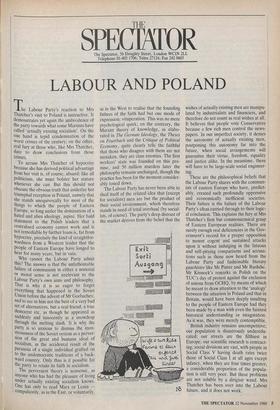The Spectator, 56 Doughty Street, London WC1N 2LL Telephone 01-405
1706; Telex 27124; Fax 242 0603
OUR AND POLAND
he Labour Party's reaction to Mrs Thatcher's visit to Poland is instructive. It demonstrates yet again the ambivalence of the party towards what sonic Marxists have called 'actually existing socialism'. On the one hand is tepid condemnation of the worst crimes of the century; on the other, real fury at those who, like Mrs Thatcher, dare to draw conclusions from those crimes.
To accuse Mrs Thatcher of hypocrisy because she has derived political advantage from her visit is, of course, absurd: like all Politicians, she must bolster her stature whenever she can. But this should not Obscure the obvious truth that underlay her triumphal reception in Poland, namely that she stands unequivocally for most of the things to which the people of Eastern Europe, so long under the domination of a hated and alien ideology, aspire. Her bald statement to the Polish leaders that a centralised economy cannot work and is not remediable by further loans is, far from hypocrisy, precisely the kind of straightfor- wardness from a Western leader that the People of Eastern Europe have longed to hear for many years, but in vain. Why cannot the Labour Party admit this? The answer is that the unfathomable failure of communism in either a material or moral sense is not irrelevant to the Labour Party's own aims and philosophy. That is why it is so eager to forget everything that happened in the Soviet Union before the advent of Mr Gorbachev, and to see in him not the best of a very bad set of alternatives, but a real friend, a true democrat etc, as though he appeared as suddenly and innocently as a snowdrop through the melting slush. It is why the party is so anxious to dismiss the mon- strousness of the Soviet system as a perver- slon of the great and humane ideal of socialism, as the accidental result of the Paranoia of a single individual grafted on to the undemocratic traditions of a back- ward country. Only thus is it possible for the party to retain its faith in socialism.
The perversion theory is nonsense, as anyone who has had the pleasure of living under actually existing socialism knows. One has only to read Marx or Lenin — Compulsorily, as in the East, or voluntarily,
as in the West to realise that the founding fathers of the faith had but one mode of expression: vituperation. This was no mere psychological quirk; on the contrary, the Marxist theory of knowledge, as elabo- rated in The German Ideology, the Theses on Feuerbach and the Critique of Political Economy, quite clearly tells the faithful that those who disagree with them are not mistaken, they are class enemies. The first workers' state was founded on this pre- mise, and 50 million murders later the philosophy remains unchanged, though the practice has been for the moment consider- ably toned down.
The Labour Party has never been able to shed itself of the related idea that (except for socialists) men are but the product of their social environment, which therefore stands in need of total overhaul (by social- ists, of course). The party's deep distrust of the market derives from the belief that the wishes of actually existing men are manipu- lated by industrialists and financiers, and therefore do not count as real wishes at all. It believes that people vote Conservative because a few rich men control the news- papers. In our imperfect society, it denies the autonomy of actually existing men, postponing this autonomy far into the future, when social arrangements will guarantee their virtue, freedom, equality and justice alike. In the meantime, there will have to be large-scale social engineer- ing.
These are the philosophical beliefs that the Labour Party shares with the commun- ists of eastern Europe who have, predict- ably, created such profoundly oppressive and economically inefficient societies. Their failure is the failure of the Labour Party's ideas carried through to their logic- al conclusion. This explains the fury at Mrs Thatcher's firm but commonsensical grasp of Eastern European realities. There are surely enough real deficiencies in the Gov- ernment's record for a proper opposition to mount cogent and sustained attacks upon it without indulging in the fatuous and self-pitying comparisons and accusa- tions such as those now heard from the Labour Party and fashionable literary gauchistes like Mr Pinter and Mr Rushdie. Mr Kinnock's remarks in Polish on the TUC's day of protest against the exclusion of unions from GCHQ, by means of which he meant to draw attention to the 'analogy' between the situation in Poland and that in Britain, would have been deeply insulting to the people of Eastern Europe had they been made by a man with even the faintest historical understanding or imagination. As it was, they were merely contemptible.
British industry remains uncompetitive; our population is disastrously underedu- cated; our streets are the filthiest in Europe; our scientific research is contract- ing; social divisions are vast, with people in Social Class V having death rates twice those of Social Class I at all ages except infancy, when they are four times greater; a considerable proportion of the popula- tion is still very poor. But these problems are not soluble by a dirigiste wand. Mrs isB Thatcher has been over into the Labour
future, and it does not work.










































































 Previous page
Previous page